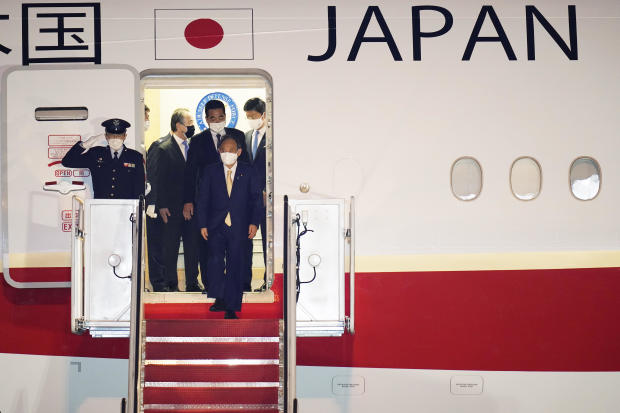Washington — President Joe Biden’s held his first face-to-face meeting with a foreign leader in Washington on Friday, sitting down with Japan’s Prime Minister Yoshihide Suga. Their talks addressed a range of issues, from climate change to the coronavirus pandemic, and from China to North Korea.
During their joint press conference, Mr. Biden talked of the “personal bonds” between the United States and Japan, and said those bonds will keep the relationship vibrant for decades to come. Mr. Biden said the U.S. and Japan renewed the Mansfeld fellowship to promote unity between the Japanese and Americans.
Through a translator, Suga thanked Mr. Biden for the warm welcome and called the United States Japan’s “best friend.” The importance of the alliance has reached new heights, Suga said. Suga also said through a translator that he and Mr. Biden had “serious talks” about China, and about the need to oppose any forceful moves from China to alter the status quo. Suga also said he spoke with Mr. Biden about racist aggressions against Asians around the world, and said Mr. Biden’s response strengthened his confidence in America’s commitment to democracy.
In the press conference, Mr. Biden was immediately asked to address why he’s pursuing infrastructure legislation before a serious legislative push on gun violence, the day after yet another mass shooting in Indiana. Mr. Biden said he’s been the strongest advocate of ending gun violence, and urged the House and Senate to pass universal background checks.
“It’s a national embarrassment. It is a national embarrassment what’s going on,” the president said of mass shootings and shootings on the nation’s streets.
Mr. Biden was not asked about the continued 15,000 refugee cap, which Democrats criticized the White House over on Friday. For his part, Suga answered a question about China’s moves on Taiwan, but did not answer a question on COVID-19 concerns concerning the upcoming Olympics.
Before Mr. Biden and Suga met, Vice President Kamala Harris met briefly with the prime minister.
“The president and I are very excited about the conversations we will have with the prime minister today,” she said. “As you know, Mr. Prime Minister, you and I met just about a month ago, during the Quad summit, which was a meeting with the United States, with our allies — Japan, with Australia, and with India — where we had extensive conversations about a collaboration and a friendship around some of the biggest challenges facing our world.”
A senior Biden administration official told reporters on Thursday that the two leaders would announce a Japanese commitment to a $2 billion initiative “to work on 5G and next steps beyond 5G” in partnership with the U.S.
“I think the idea of the visit is to underscore what we would really describe as almost an axiom or a maxim for the U.S. role in the region: The United States can only be effective in Asia when the U.S.-Japan relationship is strong and Japan is steady and stable,” the official said.
China was also expected to figure prominently in their discussions, as the U.S. seeks to enlist allies in confronting Beijing’s military expansion and human rights abuses.
It’s been a wild ride for global apparel brands like H&M, Nike, Gap and other popular retailers. The companies have faced a major blowback from consumers in China after calling out alleged Chinese repression of the country’s Uighur minority in the northwest region of Xinjiang.
“Our patriotism has been sparked,” said one Chinese man of the backlash. “People are taking this opportunity to express their love for the nation.”
“Now that they have come here to slander China, then I don’t think I will shop at H&M,” said another Beijing resident.
Citing witness accounts and satellite data, the U.S. and human rights groups have accused China of engaging in “genocide and crimes against humanity” in Xinjiang.
In addition to “the arbitrary imprisonment or other severe deprivation of physical liberty of more than one million civilians,” the U.S. State Department says the Uighurs have been subjected to “forced sterilization, coerced abortions,” rape, torture and other acts in Xinjiang.
It’s an ethnic assault that has been compared to Nazi Germany.
But when multinational retailers stopped sourcing cotton from Xinjiang, they saw sales in China plunge by as much as 20%, according to Shanghai-based market researcher Shaun Rein.
American brands, Rein says, are stuck between “a rock and a hard place: If they heed American human rights activists, they will face boycotts in China. If they don’t criticize Chinese labor practices, they face boycotts in the United States.”
Beijing has flooded the internet with a propaganda blitz, portraying life in Xinjiang as idyllic, with its ethnic minorities happily co-existing under a benevolent government. But independent investigators have never been allowed into what’s been described as a hyper-policed surveillance state.
China has been sanctioned for human rights abuses by every major industrialized country — except Japan. Many in Tokyo say Japan’s traditional, so-called “all talk, no action” form of diplomacy is no longer sustainable.
Tama University professor Akira Igata told CBS News that support is growing in Japan’s parliament to legalize sanctions — a favorite tool in the arsenal of the United States and many other powerful, wealthy nations — against countries like China and Myanmar.
“For Japan it’s necessary to show action, put money where their mouth is,” Igata said. “If we keep on saying we are afraid of China retaliation, then Japan [will] end up as a country which can’t say anything against China and we can’t do anything against China.”
China is Japan’s top trading partner, and sanctioning Beijing carries heavy risk. But Tokyo has never been under greater pressure to take a stand.


